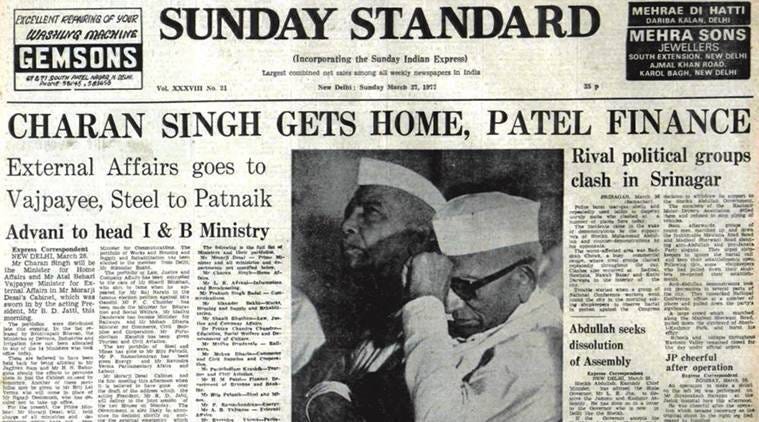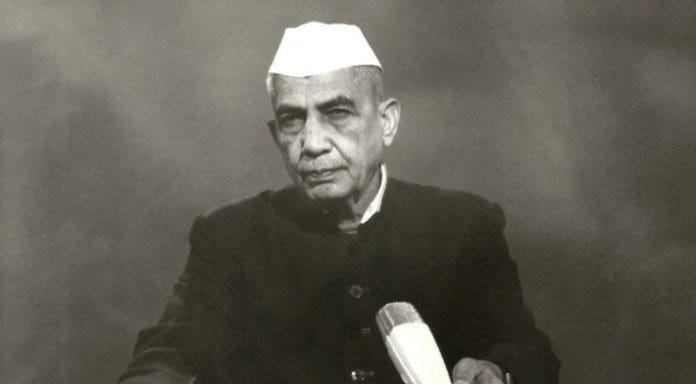Dispatch #26: Concluding Statements of All Previous Budget Speeches- Part 2
In this dispatch I have compiled the concluding statements of every Finance Ministers' Budget Speeches since 1947. It gives a good picture of the national priorities of different eras
1) Budget 1961-62: Morarji Desai
The taxation proposals which I have just outlined will, no doubt, impose an additional burden on the people, though my aim has been to minimise its incidence on the weaker sections of the community. I would, however, have failed in my duty if, on the threshold of the Third Plan, I had called for a smaller effort. We have set ourselves the onerous task of raising the standard d living of our people and of speedily building up a self-sustaining economy. We are doing this with the willing consent of the people through democratic processes. There can be no respite from sweat and sacrifice.
2) Budget 1962-63: Morarji Desai
Sir, I shall now like to conclude. In the recent elections, the nation has for the third time affirmed its confidence in our Plans and our policies. we shall have many Plans to fulfill before we reach our goal. On the whole, the Third Plan has begun well. There have been all-round increases in production, stability of prices and the external aid which we have received has enabled us, despite the continuing stringency of foreign exchange, to cover a good proportion of our developmental needs. But there is no room for complacency. Each successive year will call for greater effort on the part of everyone if we are to move forward as fast as we want to, indeed as fast as we must.
3) Budget 1963-64: Morarji Desai
It has not been an easy thing for me to contemplate that the proposals I am called upon to make for my fifth budget add up in their magnitude and range to very much more than the sum total of my proposals during the previous four budgets. It would certainly not be easy for the people to accept these proposals without a measure of privation on their part. The question that each of us individually and all of us as a nation have to consider, however, are: Can we afford not to meet the challenge of the Chinese aggression? Would it be prudent to try and meet this challenge by forsaking our aspirations for development?
4) Budget 1964-65: T T Krishnamachari
We might have to face a rehabilitation problem of some dimension. Our defense requirements may also any day make a larger demand on our resources. We have to be ready to meet any unforeseen demand by a margin for safety in our budgetary transactions. But above must prepare ourselves for shouldering ever-increasing responsibilities in the sphere of development, social justice and social security where despite what has been done so far, the road ahead is long and arduous. Sir, I hope that in framing my budget proposals, I have been at least in some measure, to keep my gaze fixed at this distant and difficult goal even as we prepare for meeting the requirements of immediate future.
5) Budget 1967-68: Morarji Desai
Our aspirations and hopes for economic well-being and a higher standard of living for millions of our people lie in accelerating the tempo of development. But this has to be done without generating further inflationary pressures, and on the basis of a realistic assessment of the resources that can be mobilized in non-inflationary manner. Government’s energies will be directed towards attaining this objective in the shortest possible time; and I propose to present a fuller picture of Government’s budgetary as well as general economic policies at the time of presentation of the final Budget in the next session of the Parliament. I hope and trust that in the course of the debate on the present Budget, Honorable Members would have many constructive suggestions to make about the future course of our policy. We, on our, part shall give consideration to the criticisms and suggestions offered so that we can carve out a surer path out of our present difficulties.
6) Budget 1971-72: Y B Chavan
The vitality of the political freedom we won and of the democratic institutions we gave ourselves has been demonstrated in recent weeks as never before. We are now engaged in a new struggle against poverty and injustice. I have no doubt that the people of India will once again prevail and we shall witness soon a new dawn of social and economic freedom in this great and ancient country.
7) Budget 1972-73: Y B Chavan
Sir, in conclusion, may I express the hope that the Budget proposals I have just presented will be judged in entirety and against the background of the formidable challenge we continue to face as a nation. The level of investment in the economy needs to be raised substantially This is necessary not only in the interest of growth, particularly industrial growth but also for making a tangible impression on the well being of the most disadvantaged sections of the society. We have also to assist Bangladesh in her immediate task of restoring a measure of stability and viability to the economy. Nor can we let down our guard in regard to the security and integrity of the nation. I hope Honorable Members would remember that I have not been unduly cautious either in providing stimulus to growth and social welfare by a substantial increase in Plan outlay. Some of my tax proposals will also serve other objectives such as self reliance. It is in this sense that I spoke at the outset of quickening the mutually reinforcing process of growth. Social justice, self-reliance, investment and resources mobilization. I can only hope that taken in their entirety, the Budget proposals will take the economy one stage forward in its march towards our cherished goals.
8) Budget 1974-75: Y B Chavan
In the year ahead lie more sources of uncertainty than ever before, which must be tackled speedily and with flexibility. I would, however, like to say that we do not propose to allow those uncertainties to blur our vision of the future. The social and economic problems that we currently face can be resolved in the long run only in the framework of a rapidly expanding economy with socialist objectives. I trust this budget is one more step in that direction.
9) Budget 1975-76: C Subramanian
My major concern in the formulation of this budget has been to stimulate production by stepping up the pace of investment in areas crucial to the health growth of the economy. The effectiveness of the measures proposed in achieving the goals that we have set for ourselves will, however depend in large measure on the willingness of the different section of community to contribute their utmost to the common endeavour. Let us all then, in Government, the Legislature and outside, rededicate ourselves to this national cause at this juncture and conduct ourselves with that discipline and determination which the occasion demands.
10) Budget 1977-78: H M Patel
My party has emphasized liberty. But liberty does not mean freedom to starve and freedom to feel unwanted. Large scale poverty and unemployment degrade those who have to suffer them, and debase those who tolerate them. We owe it to ourselves to see that these twin scourges are eradicated as quickly as possible. We have a long and a difficult road ahead of us. But there can be no doubt about our commitment to our goals and ideals. I believe we are on the right course, and this Budget represents the first step, however small, in that direction.
11) Budget 1979-80: Chaudhary Charan Singh
With this I have come to the end of my labors. I have attempted in this budget to put the maximum emphasis on agricultural and rural development and labor intensive industry, because it is now accepted by all that only that way can we eradicate poverty and unemployment in the country. I have, however, not neglected large industry and infrastructure in the process. On the contrary, I have positively encouraged them. But I have no sympathy with those industries which cater to the wants of the rich. We can have no room for production which caters to the rich and is thus a visible manifestation of the disparities which exist in the society. The elimination of the kind of poverty which exists in our country cannot be achieved overnight. It is a long process which involves large investment through the mobilization of surplus resources wherever they exist in society, better organisation and the development and transfer of appropriate know how to millions of small persons engaged in agriculture and allied occupations and village industries throughout the country. The ultimate objective is not merely to raise the standard of living of the poor but to build a society of men and women with skills, resources, imagination, and above all, hope. I like to think that this budget is a small step in that direction. But its success really depends upon a national consensus about the desirability of the objective and the need to work hard for it and a willingness on the part of the powerful and affluent sections of society to make the necessary sacrifices.





